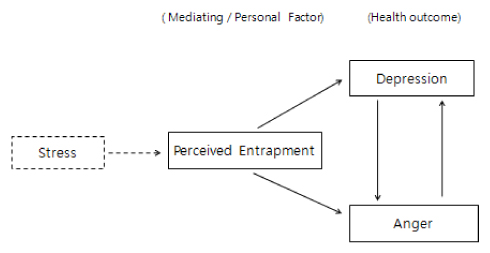Korean J Women Health Nurs.
2008 Dec;14(4):239-247. 10.4069/kjwhn.2008.14.4.239.
A Study on Perceived Entrapment, Anger and Depression in Adolescent Women
- Affiliations
-
- 1Department of Nursing, Sangji University, Korea. shchn@sangji.ac.kr
- KMID: 2307978
- DOI: http://doi.org/10.4069/kjwhn.2008.14.4.239
Abstract
-
PURPOSE: The study was designed to examine the relationship of perceived entrapment to anger and depression in adolescent women.
METHOD: Seven hundred sixty-five adolescent women were recruited from two high schools located in Seoul, Korea for a descriptive study. The instruments used were The Entrapment Scale for perceived entrapment, Spielberger's state trait anger expression inventory-Korean version for state anger and trait anger, and The Center for Epidemiology Studies Depression Scale (CES-D) for depression.
RESULTS
The score of perceived entrapment significantly correlated with state anger, trait anger and depression. The significant predictors of depression in adolescent women were perceived entrapment, state anger and trait anger explaining 47.6% of the variance in depression.
CONCLUSION
This study showed that perceived entrapment is an important predictor for depression. Therefore, in order to reduce depression in adolescent women, it is necessary to design an intervention program that helps with coping and reduces perceived entrapment.
Keyword
MeSH Terms
Figure
Cited by 1 articles
-
Relationships among Daily Hassles, Social Support, Entrapment and Mental Health Status by Gender in University Students
Suk-Hee Cheon
Korean J Women Health Nurs. 2012;18(3):223-235. doi: 10.4069/kjwhn.2012.18.3.223.
Reference
-
1. Allan S., Gilbert P. Anger and anger expression in relation to perceptions of social rank, entrapment and depressive symptoms. Pers Individ dif. 2002. 32:551–565.2. Baumeister R.F. Suicide as escape from self. Psychol Rev. 1990. 97:90–133.3. Boyce P., Mason C. An overview of depression-prone personality traits and the role of interpersonal sensitivity. The Australian and New Zealand Journal of Psychiatry. 1996. 30(1):90–103.4. Brown G.W., Bifulco A., Andrew B. Self-esteem and depression. Aetiological issues. Soc Psychiatry Psychiatr Epidemiol. 1990. 25:235–243.5. Brown G.W., Bifulco A., Harris T.O. Life events, vulnerability and onset of depression: Some refinement. Br J Psychiatry. 1987. 150:30–42.6. Burt K., Stein K. Epidemiology of depression throughout the female lifestyle. J Clin Psychiatry. 2002. 63:9–15.7. Cheon S.H. The perceived entrapment types and health of adolescent women. 2006. Seoul: Korea University;Unpublished doctoral dissertation.8. Cheon S.H. A Study on Eating Behavior, Depression, Anger, Anger Expression and BAS/BIS in Adolescent Women. Korean J Women Health Nurs. 2007. 13(4):246–255.9. Cho M.Y. A study on the influences of the stressors from school on depression in middle and high school students. 2005. Seoul: The Catholic University of Korea;Unpublished master's thesis.10. Cho S.J., Jeon H.J., Kim M.J., Kim J.K., Kim U.S., Lyoo I.K., Cho M.J. Prevalence and correlated of depressive symptoms among the adolescents in an urban area in Korea. J Korean Neuropsychiatr Assoc. 2001. 40(4):627–639.11. Choi M.R. The moderating and mediating effects of self-esteem on the relationship between life stress and depression. 2000. Chungang University: Seoul;Unpublished master's thesis.12. Chon K.K., Hahn D.W., Lee C.H., Spielberger C.D. Korean adaptation of the state-trait inventory ; Anger and blood pressure. Korean J Health Psychol. 1997. 2(1):60–78.13. Chon K.K., Lee M.G. Preliminary development of Korean version of CES-D. Korean J Clini Psychol. 1992. 11(1):65–76.14. Dixon A.K. Ethological strategies for defence in animals and humans : Their role in some psychiatric disorder. Br J Med Psychol. 1998. 71:417–445.15. Fava M., Rosenbaum J.F. Anger attacks in patients with depression. J Clin Psychiatry. 1999. 60:suppl 15. 21–24.16. Gamble W.C. Perceptions of controllability and other stressor event characteristics as determinants of coping among young adolescents and young adults. J Youth Adolesc. 1994. 26(1):65–84.17. Gilbert P., Allan S. The role of defeat and entrapment (arrested flight) in depression: An exploration of an evolutionary view. Psychol Med. 1998. 28(3):585–598.18. Gilbert P., Allan S., Brough S., Melley S., Miles J.N. Relationship of anhedonia and anxiety to social rank, defeat, and entrapment. J Affect Disord. 2002. 71:141–151.19. Gilbert P., Gilbert J. Entrapment and arrested fight and flight in depression: An exploration using focus groups. Psychol Psychother. 2003. 76:173–188.20. Hankin B.L., Abramson L.Y. Development of gender differences in depression: An elaborated cognitive vulnerability-transactional stress theory. Psychology Bulletin. 2001. 127:773–796.21. Kim K.S. The relationship among adolescents' anger coping strategies and school adjustment. Korean J. Edu. Psy. 2003. 17(3):393–410.22. Lee K.J. Psychological characteristics of high risk group in adolescent suicide. 2003. Seoul: The Catholic University of Korea;Unpublished master's thesis.23. Martin Y., Gilbert P., Mcewan K., Irons C. The relation of entrapment, shame, guilt to depression, in carers of people with dementia. Aging Ment Health. 2006. 10(2):101–106.24. Park H.S., Koo H.Y., Jang E.H. The study on predictors of depression for Korean female adolescents. J Korean Acad Nurs. 2007. 37(5):715–723.25. Park K.H. A study of stress factors and coping behavior of high school student. 2003. Seoul: Kwandong University;Unpublished Master's thesis.26. Spielberger C.D. Manual for the State-Trait Anger Expression Scale. 1996. Port Huron, Michigan: Sigma assessments system.27. Sturman E.D., Mongrain M. Self-criticism and major depression: An evolutionary perspective. Br J Clin Psychol. 2005. 44:505–519.28. Thurber C.A., Weisz J.R. You can try or you can just give up: The impact of perceived control and coping style on childhood homesickness. Dev Psychol. 1997. 33(3):508–517.29. Willner P., Goldstein R.C. Mediation of depression by perceptions of defeat and entrapment in high-stress mother. Br J Med Psychol. 2001. 74:473–485.30. Wilson G.S., Pritchard M.E., Revalee B. Individual difference in adolescent health symptoms; the effects of gender and coping. J Adolesc. 2005. 28:369–379.
- Full Text Links
- Actions
-
Cited
- CITED
-
- Close
- Share
- Similar articles
-
- The Relationship among Perceived Entrapment, Depression and Subjective Well-being of Women as Family Caregivers Caring for Dementia Elderly
- A Study on Eating Behavior, Depression, Anger, Anger Expression and BAS/BIS in Adolescent Women
- Inferiority, Depression and Psychosomatic Symptoms in Female Adolescents: The Mediating Effect of Perceived Entrapment
- Anger, Problem Behaviors, and Health Status in Adolescent Women
- Relation of Self-reported Attachment Style, Trait Anger and Anger Expression in Adolescent Women


